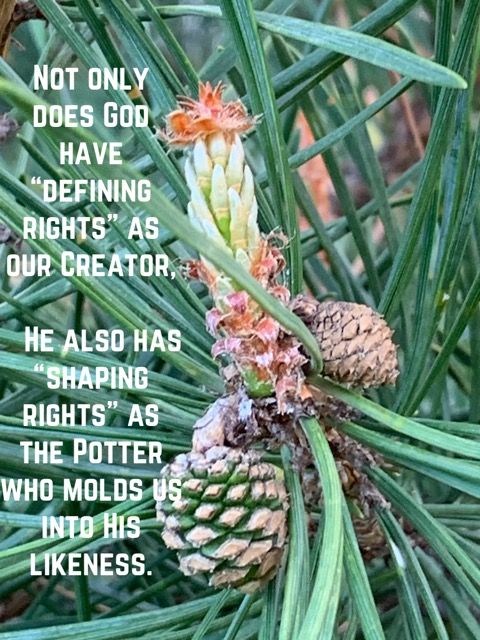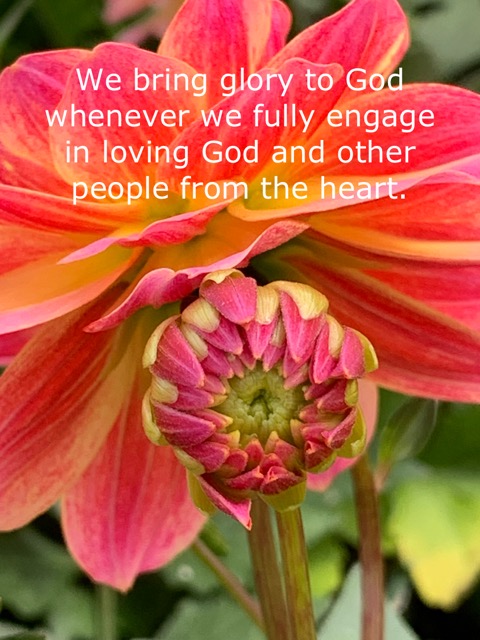
How do you become a person who responds instinctively with love and grace? How do you develop the reflexes to respond like Jesus when you’re faced with conflict and tough decisions? If you follow your trail of reactions and responses→which are motivated by your thoughts and feelings→which are shaped by your controlling images and beliefs→which are formed over time by people, places, experiences, learning, trials, and trauma→which are influenced by your God-given personality and your daily practices that shape your character formation→which make up your root system.

My “try-harder-to-please” and “do-more-good” and “avoid-the-bad” years of my formation only left me feeling angry, frustrated, guilty, anxious, inadequate, disappointed, and discouraged. After trying everything imaginable to feel secure, significant, successful, and failing miserably, I finally took the plunge into the sea of God’s endless love. I wish it hadn’t taken me thirty years after my initial salvation experience to finally surrender to God’s love. Perhaps it was my own early childhood trauma and attachment issues that made depending on and surrendering to God’s love so difficult. Although I would never want to repeat any of the seasons of my life, neither would I negotiate any of them away. God uses the tough times to cultivate more patience and tenderness with others.
Our formational years shape us, but they don’t define us. God is our Creator and Definer and Refiner. When we surrender and allow Jesus’ love and grace and truth to transform us, He takes everything that we are, all that we have, all that we’ve done, and what’s been done to us, and refines us and shapes us into His likeness. In the words of the Apostle Paul, God works together in and through “all things” to conform us into His likeness (Romans 8:28, 29). This isn’t always a “feel-good” process. Oftentimes, it’s the pain and problems, trials and trauma, that God uses to forge and form our character.

Instead of spiritual formation being such a “should” and “ought” process and problem, we can willingly decide to position ourselves to surrender to our loving, heavenly Father. Not only does God have “defining rights” as our Creator, He also has “shaping rights” as the Potter who molds and makes us into His likeness.

What and how God works to define and refine us is a Spirit-driven process. We can intentionally create spiritual disciplines and set aside uninterrupted times and places to experience God, but the Holy Spirit is always working—even in the messes—to reshape our thoughts, emotions, reactions, behavior, images, and beliefs.

Instead of fighting and opposing God and ourselves and people and formational processes, we can choose to intentionally develop a biblical worldview. The Holy Spirit desires to reshape all of our parts as we become increasingly like Christ. To use the Apostle Paul’s words to his spiritual son, Timothy, “All Scripture is inspired by God and is useful to teach us what is true and to make us realize what is wrong in our lives. It straightens us out and teaches us to do what is right. It is God’s way of preparing us in every way, fully equipped for every good thing God wants us to do” (2 Timothy 3:16,17-NLT). The more unhurried time and years that we spend with God reflecting on, integrating, applying, and teaching His Word, through prayer, journaling, and responsive service, the more our thoughts and actions and reactions can become more like Jesus.

When our love for God and people become what defines and motivates our existence, we won’t be conforming to the patterns of this world. Instead, we’ll daily allow God to define our thoughts, our priorities, and our patterns (Romans 12:1,2). Being different from the world isn’t a bad thing. It’s the Spirit of God living and breathing and interacting in and through us, creating moment-by-moment opportunities to notice and help lost and hurting people. Instead of being consumed with what’s wrong or what’s happening around us, we can allow the Holy Spirit to help us welcome daily trials that shape and form us more into people who reflect Jesus well to the world.

If we’re not living with some tension and passion and purpose, we’ve probably pushed the cruise-control and distanced ourselves so much that we don’t know or care about the lost and hurting people around us. Although this world is full of man-made gods and idols, “there is only one God and Father, who is over us all and in us all and living through us all” (Ephesians 4:6). Not only has God gifted and called us to make disciples of our people-groups, He’s shaping and positioning us to reflect the love of the Father as we interact with and care for people today.

Life is our school. People are our teachers. God is our orchestrator who engineers everything as He conforms us into His likeness. Our formational habits are either creating intimacy or distance with God, with ourselves, and with His people around us. If you see and feel love when you look in the mirror, you’re going to spend your day reflecting and sharing Jesus’ love. If you see and are full of something else when you look in the mirror, remember that Jesus knows the burdens that you carry. Invite Him to lift and to carry your burden. Invite Jesus to help and empower and live in and through you.
Life is too short to be at odds with God, with yourself, and with others. “May God, who gives this patience and encouragement, help you live in complete harmony with each other—each with the attitude of Christ Jesus toward the other” (Romans 15:5).
